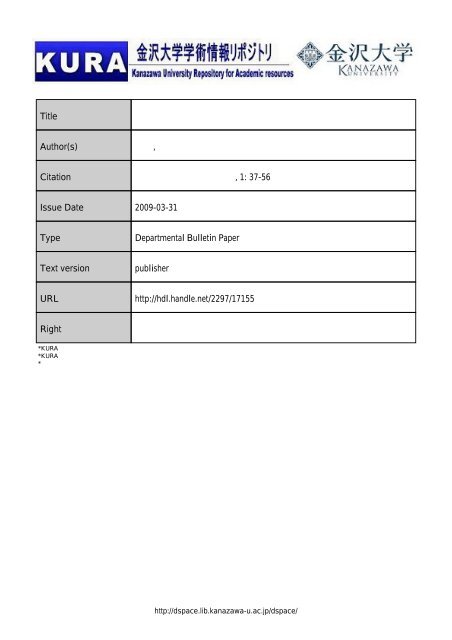Title デモクリトスの倫理学説について Author(s) 三浦, 要 ... - 金沢大学
Title デモクリトスの倫理学説について Author(s) 三浦, 要 ... - 金沢大学
Title デモクリトスの倫理学説について Author(s) 三浦, 要 ... - 金沢大学
Create successful ePaper yourself
Turn your PDF publications into a flip-book with our unique Google optimized e-Paper software.
<strong>Title</strong><br />
デモクリトスの 倫 理 学 説 について<br />
<strong>Author</strong>(s)<br />
三 浦 , <strong>要</strong><br />
Citation 金 沢 大 学 人 間 科 学 系 紀 <strong>要</strong> , 1: 37-56<br />
Issue Date 2009-03-31<br />
Type<br />
Departmental Bulletin Paper<br />
Text version publisher<br />
URL<br />
http://hdl.handle.net/2297/17155<br />
Right<br />
*KURAに 登 録 されているコンテンツの 著 作 権 は, 執 筆 者 , 出 版 社 ( 学 協 会 )などが 有 します。<br />
*KURAに 登 録 されているコンテンツの 利 用 については, 著 作 権 法 に 規 定 されている 私 的 使 用 や 引 用 などの 範 囲 内 で 行 ってください。<br />
* 著 作 権 法 に 規 定 されている 私 的 使 用 や 引 用 などの 範 囲 を 超 える 利 用 を 行 う 場 合 には, 著 作 権 者 の 許 諾 を 得 てください。ただし, 著 作 権 者<br />
から 著 作 権 等 管 理 事 業 者 ( 学 術 著 作 権 協 会 , 日 本 著 作 出 版 権 管 理 システムなど)に 権 利 委 託 されているコンテンツの 利 用 手 続 については<br />
, 各 著 作 権 等 管 理 事 業 者 に 確 認 してください。<br />
http://dspace.lib.kanazawa-u.ac.jp/dspac
920-1192 <br />
E-mail:k-miura@sgkit.ge.kanazawa-u.ac.jp<br />
<br />
<br />
<br />
<br />
<br />
<br />
<br />
<br />
<br />
<br />
<br />
<br />
<br />
70 <br />
<br />
<br />
<br />
6 <br />
<br />
<br />
<br />
5 <br />
37
17 <br />
86 31 <br />
<br />
<br />
<br />
1 <br />
<br />
<br />
<br />
2 <br />
<br />
<br />
<br />
<br />
<br />
<br />
<br />
<br />
<br />
IX45=A1(45) 3 <br />
<br />
130=B4<br />
<br />
<br />
<br />
<br />
(τέλος)<br />
38
499E7-500A1<br />
<br />
<br />
<br />
<br />
<br />
<br />
[]<br />
1 2 <br />
1094a18-22<br />
<br />
4 1095a17-20<br />
<br />
7 1098a16-17<br />
<br />
[][]<br />
<br />
<br />
<br />
128<br />
<br />
<br />
85-87<br />
<br />
<br />
<br />
2 7-6e=SVF, I, 184<br />
<br />
(ἀπονία)(ἀταραξία)<br />
<br />
39
1 7 <br />
1098a19-20<br />
<br />
<br />
<br />
<br />
<br />
<br />
<br />
<br />
<br />
<br />
<br />
<br />
Bailey <br />
<br />
<br />
4 Kahn <br />
“Hellenistic concept” 5 <br />
<br />
<br />
<br />
<br />
<br />
<br />
<br />
<br />
40
(τὸ τέλειον ἀγαθόν)(B295)<br />
τέλειον τέλος<br />
τέλεον …τὸ ἐνύπνιον: <br />
4 443B7τελεία γένεος Οἰδίπου τ᾽ἀρά:<br />
832<br />
τελείαν ψῆφον: 632<br />
<br />
<br />
<br />
6 <br />
<br />
<br />
(ἀγαθόν)(B69)<br />
<br />
7 <br />
<br />
(εὐθυµηθέντι)<br />
(τὸν βίον διάγειν)<br />
B189<br />
(ἀνθρώπῳ)(generic article)<br />
<br />
(ἄριστον) διάγειν<br />
δια- ἄγειν <br />
41
8 <br />
(βίον)<br />
<br />
9 <br />
διάγειν τὸν βίον <br />
<br />
<br />
(ἀφνεὸν βιοτὰν διάγειν)<br />
5 50-53<br />
(βίοτον εὐαίωνα Πέρσαις ὡς<br />
θεὸς διήγαγες)711<br />
(εὐδαιµονοῦντες τὸν βίον διάξετε)<br />
240 10<br />
βίον διάγειν <br />
<br />
(εὐθυµίη)<br />
<br />
[]<br />
<br />
(ὁκόσῳ αὐτέων βέλτιον<br />
πρήσσει τε καὶ διάγει)<br />
(εὐθυµότερον διάξεις)<br />
<br />
B191<br />
<br />
42
(εὐεστώ)<br />
(εὖ)(εἶναι) 11 <br />
<br />
<br />
<br />
<br />
(εὐδαιµονίη)(B170)<br />
<br />
(B171)<br />
(DK22B119)<br />
<br />
<br />
(ψυχή)<br />
<br />
<br />
<br />
<br />
<br />
<br />
<br />
187 (ψυχῆς τελεότης)<br />
<br />
43
εὐθυµίη (εὖ)<br />
(θυµός)<br />
<br />
(ἀθαµβίη)<br />
(B4, A169)(θάµβος)<br />
<br />
12 <br />
<br />
ἀταραξία ταραχή <br />
(A167)<br />
<br />
<br />
<br />
<br />
(ἐν ταραχαῖς καὶ φόβοις)<br />
(B297)<br />
<br />
13 <br />
<br />
<br />
<br />
<br />
(ταραχή)<br />
44
14 <br />
(B205)(B160)<br />
<br />
<br />
<br />
(εὐθυµός)<br />
<br />
(ἀτερπείη)<br />
(B174)<br />
Procopé <br />
15 <br />
(τέρψις)Procopé <br />
<br />
(cf. B215)<br />
16 <br />
<br />
(πάθη)(B31)<br />
<br />
191 <br />
<br />
<br />
<br />
<br />
17 <br />
18 <br />
<br />
<br />
<br />
<br />
45
19 <br />
<br />
<br />
<br />
<br />
<br />
<br />
<br />
(τέρψις)(οὖρος)<br />
(B4)<br />
<br />
(τερπόµενοι)<br />
(B200)(ἡδέα)<br />
(τέρπει)(B232)<br />
20 <br />
<br />
<br />
<br />
<br />
<br />
<br />
<br />
<br />
(B3)<br />
(µετριότης τέρψιος)(βίου<br />
συµµετρίη)(B191 )<br />
46
(τὸ µέτριον)<br />
(ἐπιτερπέστατα)(B233)<br />
(ἡδονή)<br />
(B235)<br />
<br />
(B219)(ἡδονή)(B71)<br />
(B72)<br />
(ἡδονή)<br />
(B207)<br />
<br />
(A167)<br />
<br />
191 <br />
<br />
<br />
<br />
<br />
<br />
<br />
<br />
21 <br />
<br />
<br />
<br />
<br />
(γνώµη) 22 (αὐταρκείη, cf.B210)(σωφροσύνη)<br />
<br />
(τερπνά)(ἡδονή)(B211)<br />
<br />
47
(B286)<br />
(B219)<br />
(B235)<br />
23 <br />
<br />
<br />
<br />
<br />
<br />
(ἡδύ)(ἤν µὴ συµφέρῃ)<br />
(B74)<br />
<br />
(B243 )<br />
4 <br />
(τέρψις καὶ ἀτερπίη οὖρος τῶν συµφόρων καὶ τῶν<br />
ἀσυµφόρων)<br />
Gosling and Taylor <br />
74 4 <br />
24 <br />
Gosling and Taylor ἡδονή<br />
ἡδύ τέρψις <br />
191 (τέρψις)<br />
τέρψις <br />
<br />
<br />
<br />
Warren Gosling and Taylor <br />
<br />
τέρψις ἡδονή <br />
48
25 Gosling and Taylor <br />
4 <br />
<br />
<br />
74 4 <br />
74 <br />
4 <br />
Warren <br />
<br />
74 <br />
<br />
<br />
<br />
<br />
<br />
<br />
<br />
<br />
(οὖρος)<br />
<br />
26 <br />
4 74 <br />
<br />
<br />
<br />
74 <br />
<br />
<br />
27 <br />
<br />
(ἡδύ)<br />
(B69)<br />
49
28 I 8,1-9(=B5)<br />
29 <br />
<br />
<br />
<br />
<br />
<br />
<br />
<br />
<br />
<br />
<br />
<br />
<br />
<br />
(B148)<br />
50
(B245) 30 <br />
<br />
(B181)<br />
<br />
<br />
(αἰδώς)<br />
<br />
<br />
(B244) 31 <br />
(B215) 32 .<br />
<br />
(ἑωυτὸν αἰδεῖσθαι)(B264) <br />
<br />
<br />
<br />
(B181)<br />
<br />
<br />
<br />
<br />
<br />
<br />
<br />
<br />
(B252)<br />
253 <br />
<br />
51
V, 4, 10<br />
<br />
<br />
<br />
1 <br />
7 987b1-4<br />
<br />
<br />
<br />
<br />
<br />
52
20 (C)<br />
<br />
1 Kahn (1985), 3ff.. <br />
2 Annas (2002), pp.169-171 <br />
3 Diels, H. und Kranz, W. (Hgg.),<br />
Die Fragmente der Vorsokratiker, Berlin, 6.Aufl., 1951-52 <br />
5 (1996-98 )<br />
<br />
<br />
4 Bailey(1928), pp.190-191. Warren (2002)“that terminology belongs to a period after Democritus.”<br />
(p.39)Annas (2002)<br />
(p.171)<br />
<br />
5 Kahn (1985), p.26.<br />
6 Cf. B296:<br />
<br />
7 Cf. 1 7 1098a18: <br />
(ἐν βίῳ τελείῳ)<br />
<br />
8 Cf. Smyth (1956), §1685, 3; Humbert (1960), §§593-594.<br />
9 B160 <br />
10 <br />
(ζηλωτότατον βίον ἀνθρώπων διάξεις)<br />
464<br />
(µακάριον µὲν καὶ ὁµονοητικὸν τὸν ἐνθάδε βίον διάγουσιν)<br />
256A8-B1<br />
11 257 <br />
928-929:<br />
(ἐν εὐεστοῖ φίλῃ)<br />
Vlastos (1975)ἐστώ <br />
εὐεστώ <br />
(384) ἐστώ οὐσίαφύσις ὕλη Vlastos <br />
Taylor (1967), pp.11-12 <br />
12 (B215, B216) ἀθαµβίη <br />
<br />
53
13 Vlastos (1993), p.332 n.27.<br />
14 124 <br />
<br />
[]<br />
<br />
<br />
<br />
15 Procopé (1989), pp.319-320.<br />
16 <br />
(B275, B276)<br />
(B268)Cf. Salem (1996), pp.318-319.<br />
17 Vlastos (1993)<br />
<br />
Taylor (1967)Warren<br />
(2002), pp.58ff.<br />
18 (B237, B326)<br />
19 (B166)<br />
<br />
<br />
<br />
<br />
<br />
Cf. Warren (2002), p.37: “Although there is not a great deal of evidence for this, it is nevertheless reasonable to<br />
suggest that – like Epicurus – Democritus disapproved of the damaging psychological effects of superstition,<br />
and further argued that his cosmology left no room for demiurgic or interventionist deities.”<br />
20 τέρψις ἡδονή <br />
(Chantraine (1984), sv. «τέρποµαι»)<br />
25 <br />
21 Cf. Warren (2002), pp.45-48.<br />
22 Cf. B187:…<br />
23 Warren (2002) εὐεστώ external goods (p.42)<br />
24 Gosling and Taylor (1982), pp.32-33; Taylor (1967), pp.16ff. Annas (2002)<br />
(p.176)<br />
25 Warren (2002), pp.50ffCf. Salem (1996), p.333.<br />
26 WarrenAnnas Gosling and Taylor 4 <br />
οὖρος(=ὅρος)<br />
<br />
54
27 Cf. B172.<br />
28 Balaudé (1996), pp.46ff.<br />
29 <br />
Brancacci (2007), p.192 n.55 <br />
30 Taylor (1999)(p.229)<br />
31 Cf. B84, 179, 264.<br />
32 B215 Procopé (1990), p.35 .<br />
<br />
Annas, J.(2002), “”Democritus and Eudaimonism”, in Caston, V. and Graham, D.W. (eds), Presocratic<br />
Philosophy. Essays in Honour of Alexander Mourelatos, Aldershot.<br />
Bailey, C. (1928), The Greek Atomists and Epicurus, Oxford.<br />
Balaudé, J.-F. (1996), Les theories de la justice dans l’antiquité, Paris.<br />
Brancazzi, A. (2007), “Democritus’ MOUSIKA”, in Brancazzi, A. and Morel, P.-M. (eds), Democritus: Science,<br />
the Arts, and the Care of the Soul, Leiden/Boston.<br />
Chantraine, P. (1984), Dictionnaire étymologique de la langue grecque (nouveau triage), Paris.<br />
Gosling, J.C.B. and Taylor, C.C.W. (1982), The Greeks on Pleasure, Oxford.<br />
Humbert, J. (1960), Syntaxe grecque, Paris.<br />
Kahn, Ch.H. (1985), “Democritus and the Origins of Moral Psychology”, American Journal of Philology 106.<br />
Procopé, J.F. (1989), “Democritus on Politics and the Care of the Soul”, The Classical Quarterly 39.<br />
(1990), “Democritus on Politics and the Care of the Soul: Appendix”, The Classical Quarterly 40.<br />
Salem, J. (1996), Démocrite. Grains de poussière dans un rayon de soleil, Paris.<br />
Smyth, H.W. (1956), Greek Grammar, Cambridge (Mass.).<br />
Taylor, C.C.W. (1967), “Pleasure, Knowledge and Sensation in Democritus”, Phronesis 12.<br />
(1999), The Atomists: Leucippus and Democritus. Fragments, Toronto.<br />
Vlastos, G. (1993), “Ethics and Physics in Democritus”, in his Studies in Greek Philosophy (Graham, D.W. (ed)),<br />
Vol.I, Princeton (originally published in Philosophical Review 54 (1945) and 55 (1946)).<br />
Warren, J. (2002), Epicurus and Democritean Ethics: An Archaeology of Ataraxia, Cambridge.<br />
55
On Democritus’ Ethical Theory<br />
Kaname MIURA <br />
Department of Human Sciences, Kanazawa University, Kakuma, Kanazawa, 920-1192 Japan<br />
E-mail: k-miura@sgkit.ge.kanazawa-u.ac.jp<br />
Abstract<br />
Although the bulk of the extant fragments of his works deal primarily with ethical matters,<br />
Democritus has not received the attention he deserves in his ethics; some scholars merely take his<br />
ethical fragments to be a collection of wise saws, and others think of them as a pre-theoretical recipe<br />
for happiness; at any rate, such an interpretation places too low a value on his ethical view. My<br />
concern in this paper is with Democritus’ ethical doctirne which can fully be described as a coherent<br />
ethical system. Indeed, it may safely be said that, in spite of the absence of the word telos in his<br />
fragments, Democritus offered euthymie or cheerfulness just as telos or the final goal of human life.<br />
Euthymie of the soul is identified with well-being and happiness. In Democritus’ view, all human<br />
actions seek (or should seek) to fulfill a state of cheerfulness, tranquility of mind and<br />
self-sufficiency, and the rational choice of particular pleasures in terms of usefulness does produce<br />
this cheerfulness, which is itself a pleasure but a supreme one; in this sense, particular pleasures are<br />
the necessary condition of the attainment of the cheerfulness. Democritus clearly sets up a single<br />
ethical goal and shows the way to achieve it. His ethical theory thus can be called a moderate<br />
hedonistic eudaimonism.<br />
Keyword Democritus, goal, cheerfulness, pleasure<br />
56
















